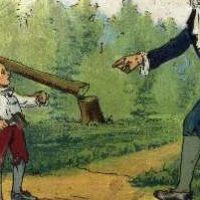(This is a sticky post. For more recent material, look to your right.)
This is probably the most common question that any professional writer (or any writer really) gets asked. And the answer is usually the same: You read, you write. But beyond that there are some questions you need to answer for yourself.
The first, and most important, is why do you want to write? Most people don’t want to be writers. They want approval, recognition, money – all things that there are easier and better ways to get. Pretend, if you would, that your future self showed up on your doorstep tomorrow and told you that you’d never get published, your work would never be shared outside of whatever reading group you joined, and you would die in a house fire that would also consume all of your works, preventing any from being published posthumously. Would you still write?
If the answer to that is yes, then the next question you need to decide on is what type of writer do you want to be. There’s an attitude among those that make a living at writing that unless you’re drawing a paycheck then you aren’t a “real” writer. And they can’t be blamed for this. It’s a tough racket and you need to tell yourself something to feel good about it. But it’s also hogwash. Emily Dickinson didn’t make dime one off her writing and if you want to tell me she wasn’t a writer I’d say you deserve a slap in the face. Conversely, Stephen King is a writer and he’s got more money than Algeria.
So do you want to write for you? Or for someone else? The most successful writers ultimately write for themselves, but spend years writing for other people. Stan Lee spent decades writing what other people told him to write until he got so fed up he finally wrote one book the way he wanted and was stunned to find that it was an outrageous success. But he wouldn’t have been able to do that if he didn’t have the tools writing for other people had given him. Another writer I’m acquainted with spent years writing copy for a wood catalogue (wood, as in planks of) until he finally developed the skills he needed to successfully write his own stuff. Trust me, spending a few years figuring out how to make wood sound interesting will sharpen your pencil better than an MFA.
My only advice in this regard would be that if you want to make a living writing, never write for anyone else unless they are paying you. Otherwise, thank them for their time and go back to your copy editing job. Can’t find a job writing? Find a job that’s interesting (EMT, lawyer, teacher) and write about that.
If you want to write for yourself, your task is really no less difficult. Although, if you’re in this situation your either an insomniac or you’ve carved out a chunk of time every day to write, you’ll ultimately be beset by doubts that you are wasting your time. And that may be true. There are over 7 billion people on the planet, a good chunk of which want to be writers (or perhaps just creators). What makes your voice unique? What do you have to say that isn’t being by said by everyone else?
Even thinking about the enormity of that task makes me want to cry a little. You’ll spend years in solitary work trying to answer that question. When you find the answer, though, it will be no different than the monk who awakens from his daily meditation to realize he knows who he is. When you figure out who you are and how that informs your writing, validation from outside sources just doesn’t have the meaning or weight it once did.
So there’s the simple fact that what type of writer you want to be has a lot more dimensions to it than the type of financial success you want to achieve. So start with deciding what type of writer you want to be, which is about as complicated a question as deciding who you want to be as a person.
That help? Didn’t think so.
Related Posts
Next Post:
Kansas: Chapter 1


























